How Would A Ban On Gambling Sponsorships Impact Premier League Clubs?
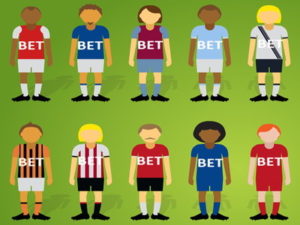 Should or shouldn’t football clubs be allowed to promote betting companies? It has been the topic of fierce debate and a dilemma for clubs between morals and finances.
Should or shouldn’t football clubs be allowed to promote betting companies? It has been the topic of fierce debate and a dilemma for clubs between morals and finances.
With regulation severely limiting advertising opportunities for betting companies in many countries, sponsoring football clubs and its resulting exposure is quite the opportunity. Betting firms are therefore more than willing to pay good money to feature as shirt sponsor. The financial package makes it attractive for clubs, yet clubs come under attack for promoting gambling on their shirts and sleeves not least for the addictive nature of gambling.
The conflicting situation has led the UK government to consider implementing a ban on shirt sponsorships from betting companies. For now, however, they prefer a voluntary ban over a forced one. Hence, why the Premier League considers phasing out gambling shirt sponsors over a three-year period. It will not affect sleeve sponsors nor English Football League clubs.
It raises the question to what extend such a ban will affect Premier League clubs’ finances? Will the resulting change in landscape of shirt and sleeve sponsors be for the better?
Current Landscape In The Premier League
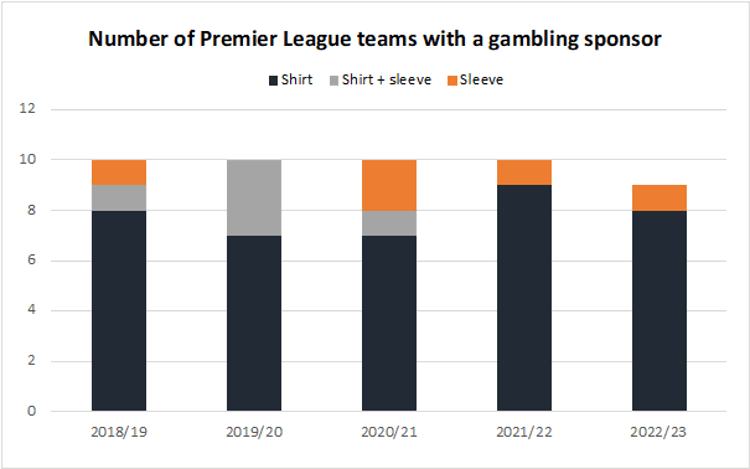
Currently, it is betting firms that lead the way in Premier League shirt sponsorships. During the past five seasons, each season there were nine or ten clubs promoting a gambling company on their shirt. Mostly as shirt sponsor, but also the occasional sleeve sponsor or both.
For the 2022/23 season, nine Premier League clubs promote a gambling company on their shirt (eight front-of-shirt and one sleeve sponsor). Compare this to the German Bundesliga, where there is just the one gambling sleeve sponsor this season.
What Is The Legislation In Other Top Five Leagues?
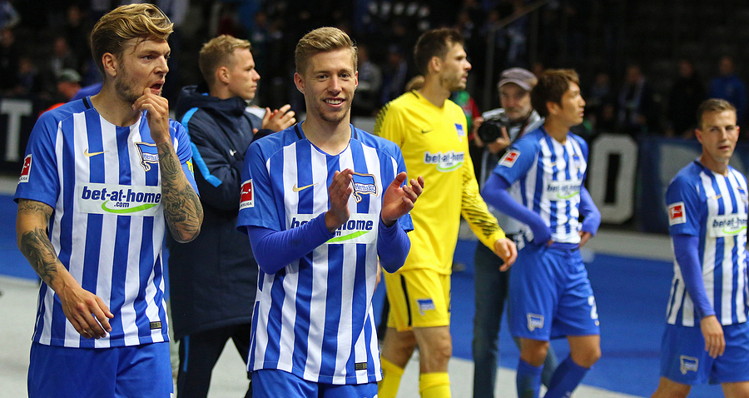
Germany, like France, has currently no ban on gambling sponsorships nor advertising. And while Bundesliga clubs have hardly any gambling shirt sponsors, they do have betting partners and promote them, for example with in-stadium advertising. In 2018, the Bundesliga themselves even partnered with sports betting company Tipico. A deal receiving heavy criticism.
A call for reforms has accompanied the criticism in Germany. One such call came from Unsere Kurve, an organisation of German fan groups, in early 2022. Their proposal included halting new gambling deals, spending half of the deals’ value on addiction prevention and an advertising ban.
Gambling Sponsorship Ban For La Liga & Serie A
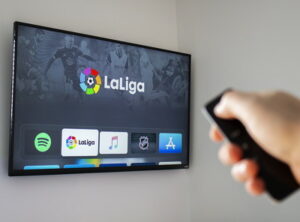 Whether German football will listen to these calls has to be seen. In Spain, there was nothing voluntary or phasing out about it. At the end of 2020, Spanish football clubs were told to end all gambling sponsorship deals by the end of the 2020/21 season. So, no shirt sponsorships, but also no other advertising, naming rights nor associated rights are allowed. An estimated €90 million loss was foreseen for La Liga teams.
Whether German football will listen to these calls has to be seen. In Spain, there was nothing voluntary or phasing out about it. At the end of 2020, Spanish football clubs were told to end all gambling sponsorship deals by the end of the 2020/21 season. So, no shirt sponsorships, but also no other advertising, naming rights nor associated rights are allowed. An estimated €90 million loss was foreseen for La Liga teams.
The law change covers all sports in Spain and had to get the approval of the European Commission. Currently, there is no European Union wide law prohibiting gambling industry marketing with each country allowed to impose its own laws, given approval by the European Commission.
Italy took similar measures and prohibited all gambling advertising in 2019. Serie A teams were allowed to continue their partnerships with gambling companies until the end of the 2018/19 season. The main concern for Italian football at the time was the loss of revenue and the competitive disparity it would create with other European football teams.
Who Is Affected By The Voluntary Ban?
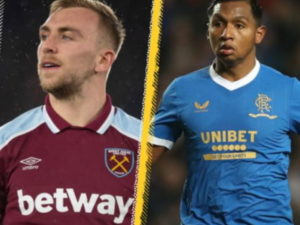 The financial loss is the main argument for clubs and leagues against gambling sponsorship bans. With some saying they would not survive without the financial windfall of these deals. It is therefore that the ban would only apply to Premier League clubs and not to English Football League clubs.
The financial loss is the main argument for clubs and leagues against gambling sponsorship bans. With some saying they would not survive without the financial windfall of these deals. It is therefore that the ban would only apply to Premier League clubs and not to English Football League clubs.
In the Premier League the proposed change would mostly impact the low and middle-tier teams, because none of the top six teams promote betting firms on their shirts. The effect is also not as severe as it was for the Serie A and La Liga clubs, as they are not allowed any form of gambling advertisement.
If a complete ban of gambling marketing gets implemented in the Premier League in the future, top six teams will also be affected, because the majority do have gambling deals based on naming and association rights.
Financial Windfall For Low And Middle-Tier Teams
 It is the low and middle-tier teams that profit from gambling shirt sponsors. On average it seems that they can agree better financial terms with betting firms than with other companies. It is not surprising that betting firms are willing to out-bid competitors, as they want the exposure with few marketing restrictions and can target the ideal customers during sports matches.
It is the low and middle-tier teams that profit from gambling shirt sponsors. On average it seems that they can agree better financial terms with betting firms than with other companies. It is not surprising that betting firms are willing to out-bid competitors, as they want the exposure with few marketing restrictions and can target the ideal customers during sports matches.
West Ham’s shirt sponsorship revenue improved significantly after replacing foreign exchange broker Alpari with betting firm Betway in 2015. The deal with Alpari was worth around £3 million per season, while Betway would initially pay West Ham £20 million over a three-and-half year period. Currently, the Hammers receive £10 million per season after signing a six-year contract extension in 2019.
Financially Ideal, Strategically Not So Much?
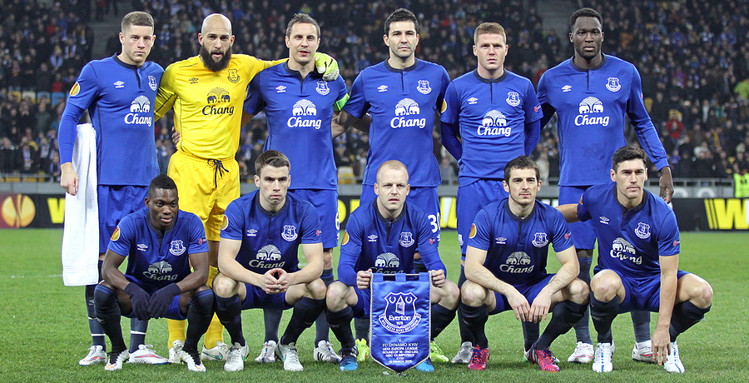
Everton receive around the same financial compensation from their betting partner Stake.com for shirt sponsoring. A deal that would not have been agreed on in ‘an ideal world’ according to past words from chief executive Denise Barrett-Baxendale.
In 2017, the Toffees struck a five-year deal with gambling company SportPesa to replace alcohol brand Chang Beer (as shown in the image above). It was described as a landmark deal for the Toffees at £7 million per season. However, the club ended the deal two years early after strategic considerations, with SportPesa being a betting firm an important factor.
For the 2020/21 and 2021/22 seasons, Everton agreed a deal with car retail platform Cazoo for £10 million. They thus moved away from a gambling shirt sponsor and were even able to improve the financial package. However, when the deal did not get an extension for the new season, the Toffees returned to a gambling shirt sponsor with Stake.com. This goes against earlier strategic decisions, but with the financial impact of COVID-19 and their decision to sever ties with several Russian related sponsors, an explainable one from a financial point of view.
Widening The Gap Between The Top Six And The Rest
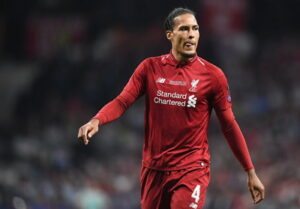 It is from shirt sponsor deals where low and middle-tier teams receive a good part of their commercial revenue, even if it does not come close to what the top six teams make. Sometimes clubs earn up to twice as much from shirt sponsor deals as they receive from kit sponsors.
It is from shirt sponsor deals where low and middle-tier teams receive a good part of their commercial revenue, even if it does not come close to what the top six teams make. Sometimes clubs earn up to twice as much from shirt sponsor deals as they receive from kit sponsors.
In 2020/21, Everton made around 22 percent of their total commercial revenue from their deal with Cazoo. For West Ham, this was even over 30 percent. For both clubs it amounted to around 5 percent of total revenue.
Shirt sponsorship value differences between four Premier League teams during the 2020/21 season:
| Value shirt deal per season | Percentage of commercial revenue | Percentage of total revenue | |
|---|---|---|---|
| Manchester United | £64 million | 28% | 13% |
| Manchester City | £45 million | 16% | 8% |
| Everton | £10 million | 22% | 5% |
| West Ham | £10million | 31% | 5% |
As clubs continue choosing gambling firms, even if it is not morally and strategically ideal, over non-gambling companies as shirt sponsor, it suggests better financial terms. When these clubs are no longer allowed to broker this type of deals, their average value of shirt sponsorship income could well decrease. As a result, the gap with top six teams could increase even further.
Will Gambling Firms Switch From Shirt To Sleeve?
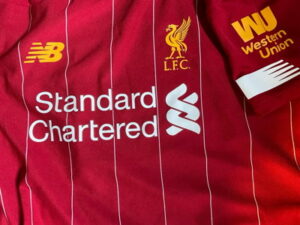 Gambling firms will look for ways around the ban and could instead opt for sleeve sponsorships. For now, the new rules will not affect sleeve tie-ups directly. Indirectly, it might lead to more gambling sleeve sponsors. During the last five seasons, only up to three teams had a gambling sleeve sponsor. Betting firms clearly prefer shirt sponsors when comparing the numbers.
Gambling firms will look for ways around the ban and could instead opt for sleeve sponsorships. For now, the new rules will not affect sleeve tie-ups directly. Indirectly, it might lead to more gambling sleeve sponsors. During the last five seasons, only up to three teams had a gambling sleeve sponsor. Betting firms clearly prefer shirt sponsors when comparing the numbers.
A ban could well make a sleeve patch more attractive than it is now. Far less visible, yet it still provides global exposure. As competition increases for these patches, Premier League clubs will hope to get better financial terms for their sleeve sponsorship deals. Now, low and middle-tier clubs earn around a half to one million pounds from their sleeve deals. A value increase may partially or completely compensate for a possible loss in shirt sponsorship revenue.
Parallels With Move Away From Alcohol
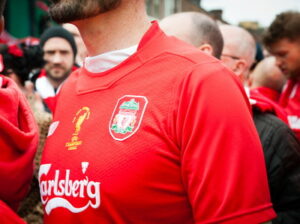 A gambling advertising ban as seen in Spain and Italy, and the partial ban now under consideration for the Premier League, has parallels to restrictions on alcohol advertising.
A gambling advertising ban as seen in Spain and Italy, and the partial ban now under consideration for the Premier League, has parallels to restrictions on alcohol advertising.
In France, no alcohol advertising of sports events is allowed, while in Spain it is not allowed to advertise alcoholic beverages with an ABV above 20 percent and there are location and time limitations for the rest.
It explains why Celta de Vigo and Real Valladolid are both sponsored by alcohol brand Estrella Galicia but play with ‘alc. 0,0 % vol’ on their logo. Brands often find a way around restrictions if it is profitable to strike a deal.
Electronics & Alcohol To Financial Services & Betting
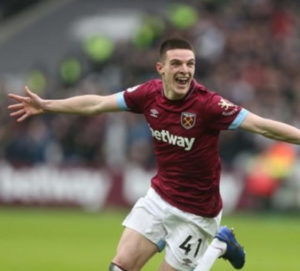 These restrictions and societal changes have caused the landscape of shirt sponsors to change over time. Gambling firms have dominated the Premier League in recent years, after Fulham introduced the first betting shirt sponsor Betfair.com in 2002/03.
These restrictions and societal changes have caused the landscape of shirt sponsors to change over time. Gambling firms have dominated the Premier League in recent years, after Fulham introduced the first betting shirt sponsor Betfair.com in 2002/03.
However, during the inaugural Premier League season in 1992/93, it was electronics companies that dominated shirt sponsorships, by sponsoring eight out of 22 teams. In addition, there were four teams with an alcohol firm as shirt sponsor.
The diversity among the shirt sponsors has decreased. During the 1992/93 season, 21 teams (out of 22) had a shirt sponsor, and these companies could be categorised in 10 different industries. Besides electronics and alcohol, there were among others automotive, chemical, timber and tools companies.
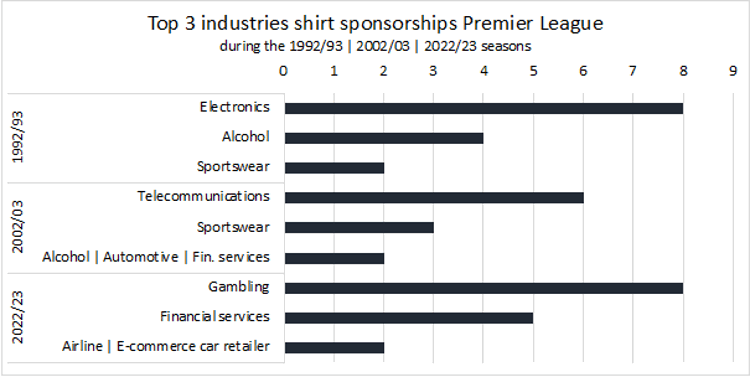
In 2002/03 (20 teams), the companies could again be divided into roughly ten different industries. Telecommunications dominated, followed by sportswear related brands. There were still two alcohol brands active as shirt sponsor, but also companies from for example the airline, gambling, insurance and semiconductors industries.
Since the 2017/18 season, no Premier League club had an alcohol related front-of-shirt sponsorship. Only Leicester City has an alcohol sleeve tie-up with beer brand Bia Saigon.
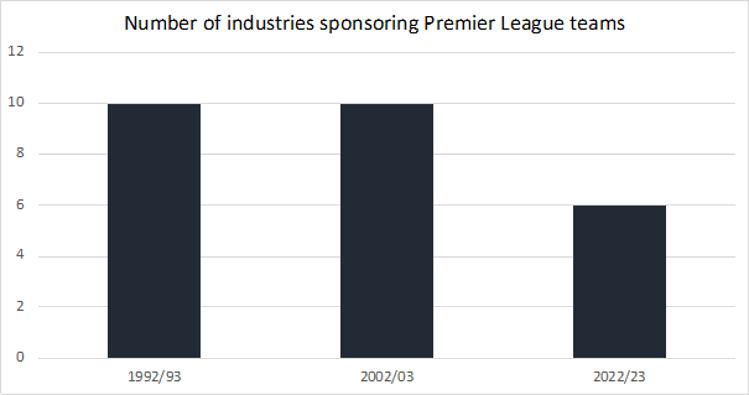
These days electronics sponsorships are also less common, while more and more financial services firms see the advantages of Premier League shirt sponsoring. During the 2022/23 season (20 teams) there is less diversity than there was both ten and twenty years ago, with just six different industries active as shirt sponsor.
The low and middle-tier teams that have no gambling shirt sponsor now, are often sponsored by car retail platforms (a trend of the last two, three years) or financial companies involved in cryptocurrency, online trading or blockchain.
A Shift To High-risk Financial Firms
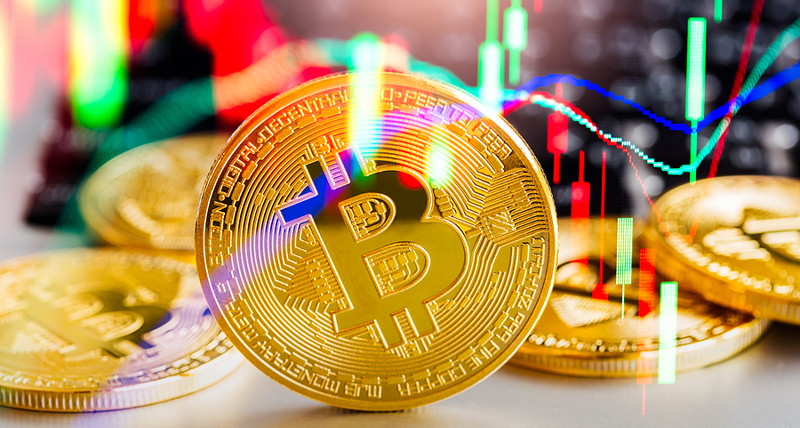
Especially these ‘new-age’ financial firms have started investing in football sponsorships and are ready to take over from gambling firms. This is exactly what happened in La Liga after Spain implemented the gambling advertisement ban in 2021. Of the seven La Liga teams with a gambling shirt sponsor in 2020/21, most struck deals with financial firms, including cryptocurrency and financial trading platforms in the following season.
A similar trajectory can be expected for the Premier League. However, these are niches of the financial industry that, like gambling, carry risk. With relatively little regulation and a volatile market, it begs the question whether similar problems and discussions will not soon arise. And whether these companies are as stable to enter a long-term partnership.
Italian side Inter, for example, agreed a multi-year €85 million sleeve deal with blockchain network DigitalBits that later got upgraded to a shirt sponsor deal. However, after the firm missed out on initial payments, the Serie A side now considers legal actions.
So, the proposed ban on gambling shirt sponsors will open the door, for better or worse, for other industries to take advantage. It is the low and middle-tier teams that need to adjust and will notice the effects financially. But the past has shown that the sponsorship market is able to adjust to restrictions and changes in society.



